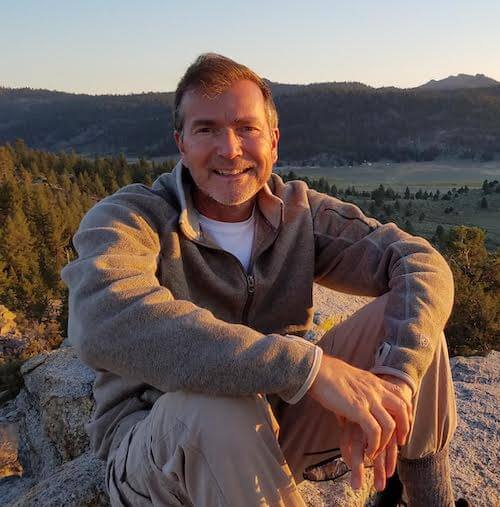
The other day, on my morning walk in full sun, I felt the crisp touch of cool(er) air on my skin, like a finger of fall tapping on my shoulder. Every year when I experience this moment, I have mixed feelings in an instant: a combination of wow, where did summer go — and excitement for chunky sweaters.
Seasons come with feelings, memories, and — according to Ayurveda — principles that can guide us to balance and well-being. Ayurveda is the 5,000 year-old sister science to yoga, a wellness system so layered and multi-dimensional, that keeping it simple might be the best way to weave it into your life successfully.
Since I started integrating Ayurveda into my life this way, here are a few incredible things that have happened:
A basic principle of healing in Ayurveda is that “one may create balance in the internal forces working in the individual by altering diet and habits of living to counteract changes in his external environment,” according to Dr. Vasant Lad, professor of Ayurvedic medicine and head of The Ayurvedic Institute, one of the top schools outside of India.
If you want to commit to living Ayurvedically, it's an essential, involved, and responsible process to work with an Ayurvedic expert to determine your natural, internal state and weigh it against your external environment (e.g., month, time of day, people, events, weather, food, etc.).
Paula Wild, certified Yoga Therapist, supports well-being by zeroing in on the five elements of Ayurveda: earth, water, fire, air, and space. “By raising our awareness of how these qualities interact in our bodies, minds, relationships, and environments, we have the opportunity to work with them to achieve optimal well-being and to infinitely expand our potential,” shared Wild.
Counter-balance shifts have the potential to resolve (or prevent) some less-than-desirable conditions; however, general seasonal guidance that is quite simple, harmless, and easy to follow can help you discover Ayurvedic living.
During fall to early winter, there is a greater presence of qualities represented by the Vata dosha: movement, light, clear, rough, crisp, spacious, airy, and cold (cold air versus cold earth). The doshas can be present in a person, in an environment, in items, etc.
Those who naturally embody these aspects of vata dosha need to be more vigilant to balance an excess of these qualities. Yet, all of us can feel excess vata substances during this time of year in the Northern Hemisphere. Excess vata can show up in several ways, such as increased anxiety, insomnia, extremely dry skin, head spaciness, feeling cold all the time (I mean all the time), cracking joints, or a general feeling of being mentally “all over the place” and ungrounded.
What should we do? We are all so different, and conditions can vary quite a bit. We might have a vata imbalance — or not! So, in the fall, let’s not overthink it, but instead, incorporate practical and simple choices to cultivate more mind-body harmony each day.
Here are four categories of self-care, each featuring one, fall-balancing practice that won’t require a life overhaul or a ton of your time.
Breath: Allow Longer Exhales
Since anxiety and feeling scatter-brained can come with the season, soothing your nervous system is key to feeling calm and more even-keeled. Take three breaths, inhaling for a count of four, and exhaling for a count of six. This breathing technique cues your parasympathetic nervous system, which regulates your body and helps you relax. This one can help you get to sleep, too.
Body: Seek Comfort
Invite more softness, gentleness, and warmth to help balance the rough and cool qualities of the season. Wrap yourself in a warm, soft sweater, stay in savasana under a blanket for a little longer, or sink into a cozy couch for a moment of quiet with warm, herbal tea.
Food: Nourish with Warmth and Density
You can feel more grounded by eating regularly, on a schedule, and incorporating more moist, warm, and dense foods (not heavy, as in oily, but ones with more weight to them). Think: butternut squash soup, and ditch the dried crackers and cold salads for now.
Beauty: Lubricate and Calm Down
Balance the qualities of dryness and light by giving yourself a warming and lubricating foot massage with cold pressed sesame oil, the only oil known to be able to penetrate all seven layers of the skin. You can add sandalwood essential oil to calm your mind or cypress to support circulation.
Bonus Tips
‘Tis the season to be too much in your head, so choose to watch less anxiety-inducing tv shows, for example. Reduce your earbud time or at least play soft tunes with soothing bass to counteract mental overstimulation and spaciness, both of which can be extra challenging during vata season.
The operative word here is “balance.” September is National Self-Care Awareness Month. Think: simple, practical, consistent, and successful well-being.

“Remembering to be as self compassionate as I can and praying to the divine that we're all a part of.”
–Aaron
“Prayer, reading, meditation, walking.”
–Karen
“Erratically — which is an ongoing stream of practice to find peace.”
–Charles
“Try on a daily basis to be kind to myself and to realize that making mistakes is a part of the human condition. Learning from our mistakes is a journey. But it starts with compassion and caring. First for oneself.”
–Steve
“Physically: aerobic exercise, volleyball, ice hockey, cycling, sailing. Emotionally: unfortunately I have to work to ‘not care’ about people or situations which may end painfully. Along the lines of ‘attachment is the source of suffering’, so best to avoid it or limit its scope. Sad though because it could also be the source of great joy. Is it worth the risk?“
–Rainer


“It's time for my heart to be nurtured on one level yet contained on another. To go easy on me and to allow my feelings to be validated, not judged harshly. On the other hand, to let the heart rule with equanimity and not lead the mind and body around like a master.”
–Suzanne
“I spend time thinking of everything I am grateful for, and I try to develop my ability to express compassion for myself and others without reservation. I take time to do the things I need to do to keep myself healthy and happy. This includes taking experiential workshops, fostering relationships, and participating within groups which have a similar interest to become a more compassionate and fulfilled being.“
–Peter


“Self-forgiveness for my own judgments. And oh yeah, coming to Esalen.”
–David B.
“Hmm, this is a tough one! I guess I take care of my heart through fostering relationships with people I feel connected to. Spending quality time with them (whether we're on the phone, through messages/letters, on Zoom, or in-person). Being there for them, listening to them, sharing what's going on with me, my struggles and my successes... like we do in the Esalen weekly Friends of Esalen Zoom sessions!”
–Lori

“I remind myself in many ways of the fact that " Love is all there is!" LOVE is the prize and this one precious life is the stage we get to learn our lessons. I get out into nature, hike, camp, river kayak, fly fish, garden, I create, I dance (not enough!), and I remain grateful for each day, each breath, each moment. Being in the moment, awake, and remembering the gift of life and my feeling of gratitude for all of creation.”
–Steven
“My physical heart by limiting stress and eating a heart-healthy diet. My emotional heart by staying in love with the world and by knowing that all disappointment and loss will pass.“
–David Z.
Today, September 29, is World Heart Day. Strike up a conversation with your own heart and as you feel comfortable, encourage others to do the same. As part of our own transformations and self-care, we sometimes ask for others to illuminate and enliven our hearts or speak our love language.
What if we could do this for ourselves too, even if just for today… or to start a heart practice, forever?
You can also check into an upcoming workshop, The Five Elements in Yoga and Chinese Medicine, taught by yogis and Ayurveda practitioners, Paula Wild and Jiling Lin, October 4-8, 2021.
Christine Chen is a two-time Emmy winning journalist, best-selling author, California native, and senior teacher of yoga and Ayurveda.

The other day, on my morning walk in full sun, I felt the crisp touch of cool(er) air on my skin, like a finger of fall tapping on my shoulder. Every year when I experience this moment, I have mixed feelings in an instant: a combination of wow, where did summer go — and excitement for chunky sweaters.
Seasons come with feelings, memories, and — according to Ayurveda — principles that can guide us to balance and well-being. Ayurveda is the 5,000 year-old sister science to yoga, a wellness system so layered and multi-dimensional, that keeping it simple might be the best way to weave it into your life successfully.
Since I started integrating Ayurveda into my life this way, here are a few incredible things that have happened:
A basic principle of healing in Ayurveda is that “one may create balance in the internal forces working in the individual by altering diet and habits of living to counteract changes in his external environment,” according to Dr. Vasant Lad, professor of Ayurvedic medicine and head of The Ayurvedic Institute, one of the top schools outside of India.
If you want to commit to living Ayurvedically, it's an essential, involved, and responsible process to work with an Ayurvedic expert to determine your natural, internal state and weigh it against your external environment (e.g., month, time of day, people, events, weather, food, etc.).
Paula Wild, certified Yoga Therapist, supports well-being by zeroing in on the five elements of Ayurveda: earth, water, fire, air, and space. “By raising our awareness of how these qualities interact in our bodies, minds, relationships, and environments, we have the opportunity to work with them to achieve optimal well-being and to infinitely expand our potential,” shared Wild.
Counter-balance shifts have the potential to resolve (or prevent) some less-than-desirable conditions; however, general seasonal guidance that is quite simple, harmless, and easy to follow can help you discover Ayurvedic living.
During fall to early winter, there is a greater presence of qualities represented by the Vata dosha: movement, light, clear, rough, crisp, spacious, airy, and cold (cold air versus cold earth). The doshas can be present in a person, in an environment, in items, etc.
Those who naturally embody these aspects of vata dosha need to be more vigilant to balance an excess of these qualities. Yet, all of us can feel excess vata substances during this time of year in the Northern Hemisphere. Excess vata can show up in several ways, such as increased anxiety, insomnia, extremely dry skin, head spaciness, feeling cold all the time (I mean all the time), cracking joints, or a general feeling of being mentally “all over the place” and ungrounded.
What should we do? We are all so different, and conditions can vary quite a bit. We might have a vata imbalance — or not! So, in the fall, let’s not overthink it, but instead, incorporate practical and simple choices to cultivate more mind-body harmony each day.
Here are four categories of self-care, each featuring one, fall-balancing practice that won’t require a life overhaul or a ton of your time.
Breath: Allow Longer Exhales
Since anxiety and feeling scatter-brained can come with the season, soothing your nervous system is key to feeling calm and more even-keeled. Take three breaths, inhaling for a count of four, and exhaling for a count of six. This breathing technique cues your parasympathetic nervous system, which regulates your body and helps you relax. This one can help you get to sleep, too.
Body: Seek Comfort
Invite more softness, gentleness, and warmth to help balance the rough and cool qualities of the season. Wrap yourself in a warm, soft sweater, stay in savasana under a blanket for a little longer, or sink into a cozy couch for a moment of quiet with warm, herbal tea.
Food: Nourish with Warmth and Density
You can feel more grounded by eating regularly, on a schedule, and incorporating more moist, warm, and dense foods (not heavy, as in oily, but ones with more weight to them). Think: butternut squash soup, and ditch the dried crackers and cold salads for now.
Beauty: Lubricate and Calm Down
Balance the qualities of dryness and light by giving yourself a warming and lubricating foot massage with cold pressed sesame oil, the only oil known to be able to penetrate all seven layers of the skin. You can add sandalwood essential oil to calm your mind or cypress to support circulation.
Bonus Tips
‘Tis the season to be too much in your head, so choose to watch less anxiety-inducing tv shows, for example. Reduce your earbud time or at least play soft tunes with soothing bass to counteract mental overstimulation and spaciness, both of which can be extra challenging during vata season.
The operative word here is “balance.” September is National Self-Care Awareness Month. Think: simple, practical, consistent, and successful well-being.

“Remembering to be as self compassionate as I can and praying to the divine that we're all a part of.”
–Aaron
“Prayer, reading, meditation, walking.”
–Karen
“Erratically — which is an ongoing stream of practice to find peace.”
–Charles
“Try on a daily basis to be kind to myself and to realize that making mistakes is a part of the human condition. Learning from our mistakes is a journey. But it starts with compassion and caring. First for oneself.”
–Steve
“Physically: aerobic exercise, volleyball, ice hockey, cycling, sailing. Emotionally: unfortunately I have to work to ‘not care’ about people or situations which may end painfully. Along the lines of ‘attachment is the source of suffering’, so best to avoid it or limit its scope. Sad though because it could also be the source of great joy. Is it worth the risk?“
–Rainer


“It's time for my heart to be nurtured on one level yet contained on another. To go easy on me and to allow my feelings to be validated, not judged harshly. On the other hand, to let the heart rule with equanimity and not lead the mind and body around like a master.”
–Suzanne
“I spend time thinking of everything I am grateful for, and I try to develop my ability to express compassion for myself and others without reservation. I take time to do the things I need to do to keep myself healthy and happy. This includes taking experiential workshops, fostering relationships, and participating within groups which have a similar interest to become a more compassionate and fulfilled being.“
–Peter


“Self-forgiveness for my own judgments. And oh yeah, coming to Esalen.”
–David B.
“Hmm, this is a tough one! I guess I take care of my heart through fostering relationships with people I feel connected to. Spending quality time with them (whether we're on the phone, through messages/letters, on Zoom, or in-person). Being there for them, listening to them, sharing what's going on with me, my struggles and my successes... like we do in the Esalen weekly Friends of Esalen Zoom sessions!”
–Lori

“I remind myself in many ways of the fact that " Love is all there is!" LOVE is the prize and this one precious life is the stage we get to learn our lessons. I get out into nature, hike, camp, river kayak, fly fish, garden, I create, I dance (not enough!), and I remain grateful for each day, each breath, each moment. Being in the moment, awake, and remembering the gift of life and my feeling of gratitude for all of creation.”
–Steven
“My physical heart by limiting stress and eating a heart-healthy diet. My emotional heart by staying in love with the world and by knowing that all disappointment and loss will pass.“
–David Z.
Today, September 29, is World Heart Day. Strike up a conversation with your own heart and as you feel comfortable, encourage others to do the same. As part of our own transformations and self-care, we sometimes ask for others to illuminate and enliven our hearts or speak our love language.
What if we could do this for ourselves too, even if just for today… or to start a heart practice, forever?
You can also check into an upcoming workshop, The Five Elements in Yoga and Chinese Medicine, taught by yogis and Ayurveda practitioners, Paula Wild and Jiling Lin, October 4-8, 2021.

The other day, on my morning walk in full sun, I felt the crisp touch of cool(er) air on my skin, like a finger of fall tapping on my shoulder. Every year when I experience this moment, I have mixed feelings in an instant: a combination of wow, where did summer go — and excitement for chunky sweaters.
Seasons come with feelings, memories, and — according to Ayurveda — principles that can guide us to balance and well-being. Ayurveda is the 5,000 year-old sister science to yoga, a wellness system so layered and multi-dimensional, that keeping it simple might be the best way to weave it into your life successfully.
Since I started integrating Ayurveda into my life this way, here are a few incredible things that have happened:
A basic principle of healing in Ayurveda is that “one may create balance in the internal forces working in the individual by altering diet and habits of living to counteract changes in his external environment,” according to Dr. Vasant Lad, professor of Ayurvedic medicine and head of The Ayurvedic Institute, one of the top schools outside of India.
If you want to commit to living Ayurvedically, it's an essential, involved, and responsible process to work with an Ayurvedic expert to determine your natural, internal state and weigh it against your external environment (e.g., month, time of day, people, events, weather, food, etc.).
Paula Wild, certified Yoga Therapist, supports well-being by zeroing in on the five elements of Ayurveda: earth, water, fire, air, and space. “By raising our awareness of how these qualities interact in our bodies, minds, relationships, and environments, we have the opportunity to work with them to achieve optimal well-being and to infinitely expand our potential,” shared Wild.
Counter-balance shifts have the potential to resolve (or prevent) some less-than-desirable conditions; however, general seasonal guidance that is quite simple, harmless, and easy to follow can help you discover Ayurvedic living.
During fall to early winter, there is a greater presence of qualities represented by the Vata dosha: movement, light, clear, rough, crisp, spacious, airy, and cold (cold air versus cold earth). The doshas can be present in a person, in an environment, in items, etc.
Those who naturally embody these aspects of vata dosha need to be more vigilant to balance an excess of these qualities. Yet, all of us can feel excess vata substances during this time of year in the Northern Hemisphere. Excess vata can show up in several ways, such as increased anxiety, insomnia, extremely dry skin, head spaciness, feeling cold all the time (I mean all the time), cracking joints, or a general feeling of being mentally “all over the place” and ungrounded.
What should we do? We are all so different, and conditions can vary quite a bit. We might have a vata imbalance — or not! So, in the fall, let’s not overthink it, but instead, incorporate practical and simple choices to cultivate more mind-body harmony each day.
Here are four categories of self-care, each featuring one, fall-balancing practice that won’t require a life overhaul or a ton of your time.
Breath: Allow Longer Exhales
Since anxiety and feeling scatter-brained can come with the season, soothing your nervous system is key to feeling calm and more even-keeled. Take three breaths, inhaling for a count of four, and exhaling for a count of six. This breathing technique cues your parasympathetic nervous system, which regulates your body and helps you relax. This one can help you get to sleep, too.
Body: Seek Comfort
Invite more softness, gentleness, and warmth to help balance the rough and cool qualities of the season. Wrap yourself in a warm, soft sweater, stay in savasana under a blanket for a little longer, or sink into a cozy couch for a moment of quiet with warm, herbal tea.
Food: Nourish with Warmth and Density
You can feel more grounded by eating regularly, on a schedule, and incorporating more moist, warm, and dense foods (not heavy, as in oily, but ones with more weight to them). Think: butternut squash soup, and ditch the dried crackers and cold salads for now.
Beauty: Lubricate and Calm Down
Balance the qualities of dryness and light by giving yourself a warming and lubricating foot massage with cold pressed sesame oil, the only oil known to be able to penetrate all seven layers of the skin. You can add sandalwood essential oil to calm your mind or cypress to support circulation.
Bonus Tips
‘Tis the season to be too much in your head, so choose to watch less anxiety-inducing tv shows, for example. Reduce your earbud time or at least play soft tunes with soothing bass to counteract mental overstimulation and spaciness, both of which can be extra challenging during vata season.
The operative word here is “balance.” September is National Self-Care Awareness Month. Think: simple, practical, consistent, and successful well-being.

“Remembering to be as self compassionate as I can and praying to the divine that we're all a part of.”
–Aaron
“Prayer, reading, meditation, walking.”
–Karen
“Erratically — which is an ongoing stream of practice to find peace.”
–Charles
“Try on a daily basis to be kind to myself and to realize that making mistakes is a part of the human condition. Learning from our mistakes is a journey. But it starts with compassion and caring. First for oneself.”
–Steve
“Physically: aerobic exercise, volleyball, ice hockey, cycling, sailing. Emotionally: unfortunately I have to work to ‘not care’ about people or situations which may end painfully. Along the lines of ‘attachment is the source of suffering’, so best to avoid it or limit its scope. Sad though because it could also be the source of great joy. Is it worth the risk?“
–Rainer


“It's time for my heart to be nurtured on one level yet contained on another. To go easy on me and to allow my feelings to be validated, not judged harshly. On the other hand, to let the heart rule with equanimity and not lead the mind and body around like a master.”
–Suzanne
“I spend time thinking of everything I am grateful for, and I try to develop my ability to express compassion for myself and others without reservation. I take time to do the things I need to do to keep myself healthy and happy. This includes taking experiential workshops, fostering relationships, and participating within groups which have a similar interest to become a more compassionate and fulfilled being.“
–Peter


“Self-forgiveness for my own judgments. And oh yeah, coming to Esalen.”
–David B.
“Hmm, this is a tough one! I guess I take care of my heart through fostering relationships with people I feel connected to. Spending quality time with them (whether we're on the phone, through messages/letters, on Zoom, or in-person). Being there for them, listening to them, sharing what's going on with me, my struggles and my successes... like we do in the Esalen weekly Friends of Esalen Zoom sessions!”
–Lori

“I remind myself in many ways of the fact that " Love is all there is!" LOVE is the prize and this one precious life is the stage we get to learn our lessons. I get out into nature, hike, camp, river kayak, fly fish, garden, I create, I dance (not enough!), and I remain grateful for each day, each breath, each moment. Being in the moment, awake, and remembering the gift of life and my feeling of gratitude for all of creation.”
–Steven
“My physical heart by limiting stress and eating a heart-healthy diet. My emotional heart by staying in love with the world and by knowing that all disappointment and loss will pass.“
–David Z.
Today, September 29, is World Heart Day. Strike up a conversation with your own heart and as you feel comfortable, encourage others to do the same. As part of our own transformations and self-care, we sometimes ask for others to illuminate and enliven our hearts or speak our love language.
What if we could do this for ourselves too, even if just for today… or to start a heart practice, forever?
You can also check into an upcoming workshop, The Five Elements in Yoga and Chinese Medicine, taught by yogis and Ayurveda practitioners, Paula Wild and Jiling Lin, October 4-8, 2021.
Christine Chen is a two-time Emmy winning journalist, best-selling author, California native, and senior teacher of yoga and Ayurveda.